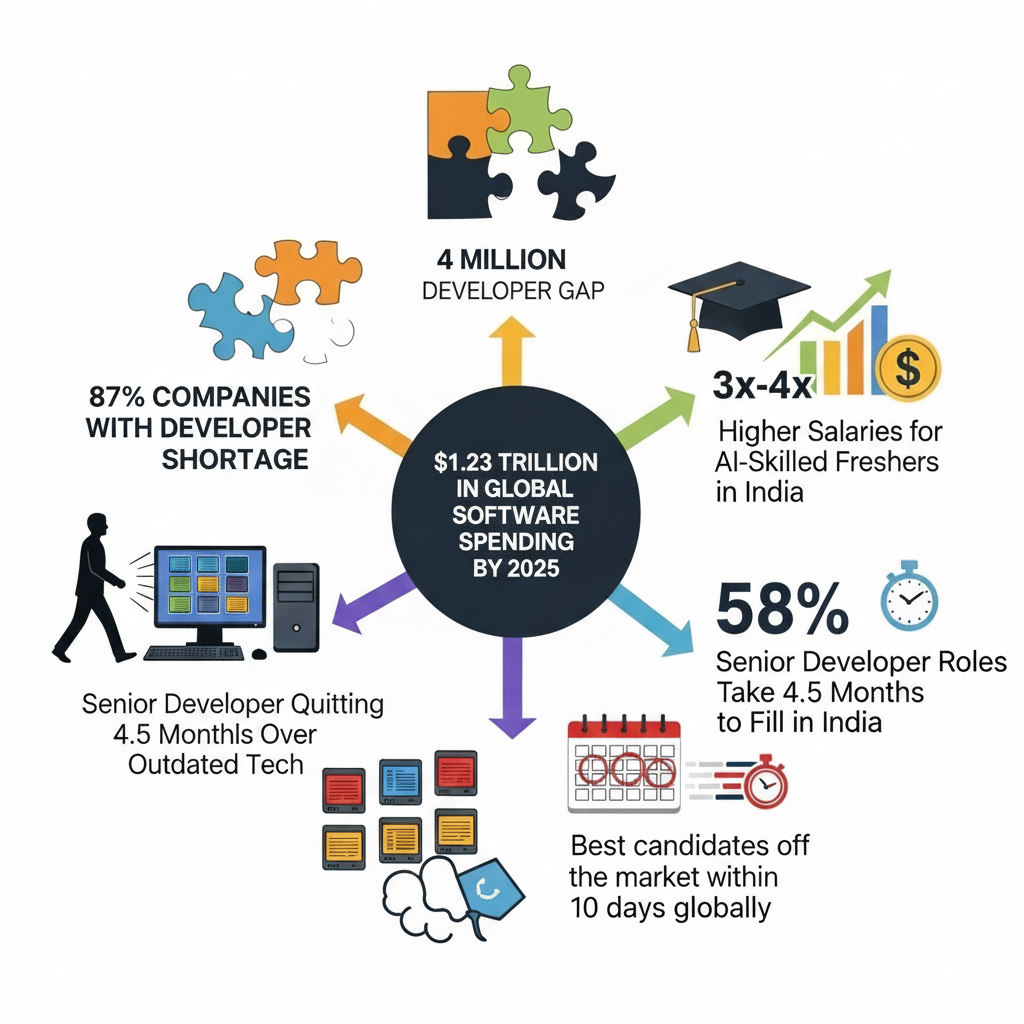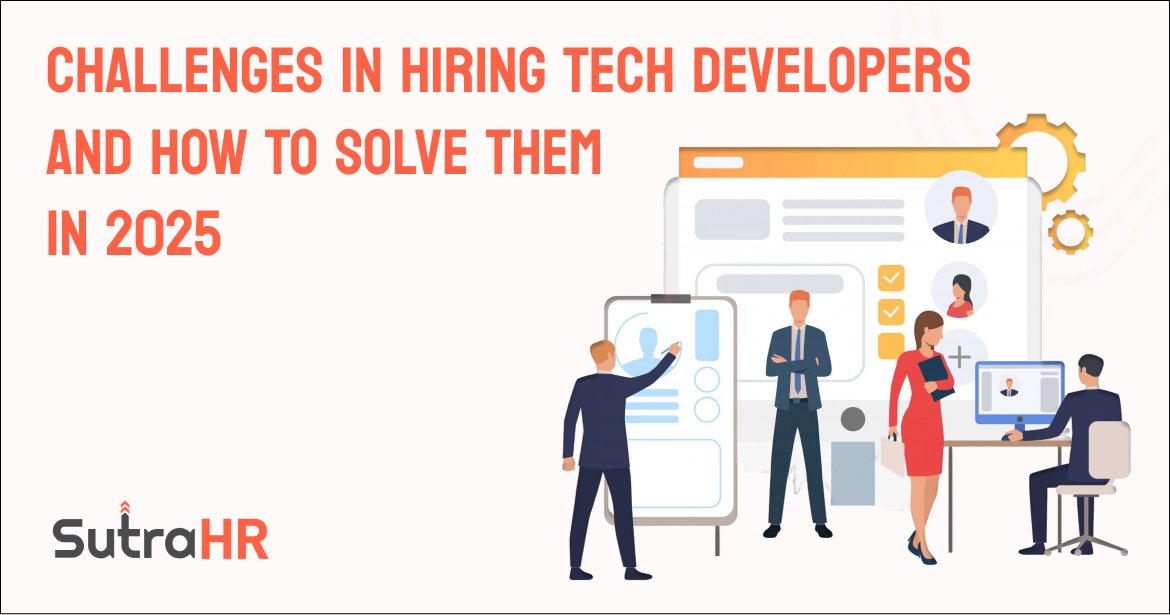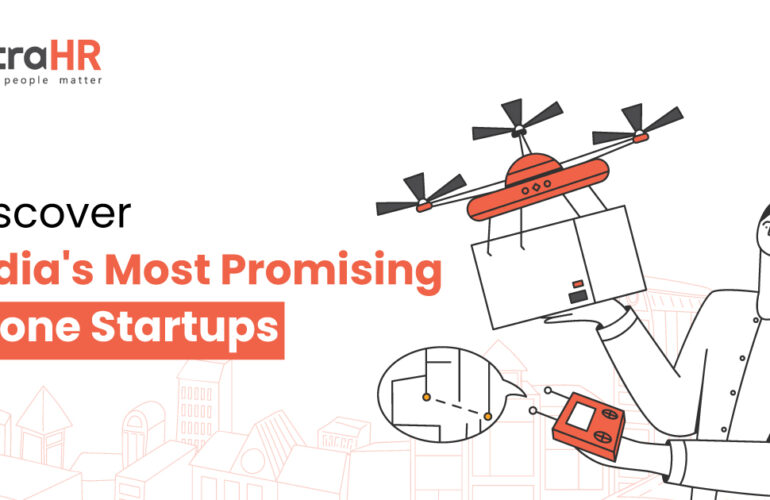Biggest Challenges in Hiring Tech Developers (and How to Solve Them in 2025)
Hiring skilled developers is tougher than ever. With rapid innovation and global competition, companies are struggling to overcome the challenges in hiring tech developers and keeping the right tech talent. Startups face an even bigger hurdle: how do you compete with tech giants for top talent? If you’re a founder, CTO, or HR professional, you’ve likely experienced these tech recruitment challenges firsthand.
The numbers tell the story:
- Global software spending is projected to hit $1.23 trillion in 2025.
- 87% of companies report a shortage of skilled developers, with the gap expected to exceed 4 million developers by the end of 2025. (Source: Korn Ferry)
- In India, AI-skilled freshers command 3x–4x higher salaries than peers.
- 58% of senior developers say they’d quit jobs over outdated tech stacks. (Source: Tech Radar)
- Globally, the best candidates are off the market within 10 days, while senior developer roles in India can take up to 4.5 months to fill. (Source: Join Genius)

At SutraHR, we’ve spent over 15 years helping businesses hire smarter and faster. Here’s a breakdown of the biggest challenges in hiring tech developers and our proven solutions.
Why Is Hiring Tech Developers So Challenging?
The tech landscape is shifting, creating a perfect storm for recruiters:
- Talent shortage vs demand surge: Niche skills in fields like Generative AI and cybersecurity are in high demand, but the talent pool isn’t growing fast enough.
- Global competition: Remote work means your startup in India now competes directly with firms in Silicon Valley.
- Evolving skills: New frameworks and AI tools require even senior developers to continuously upskill.
Top Challenges in Tech Hiring Developers (2025)
Hiring developers has never been easy, but today’s challenges are more complex than ever. Here’s a look at the biggest hurdles and their solutions.
1. Talent Shortage and High Competition
The Challenge
Over 60% of organizations struggle to find skilled developers. Big tech companies offer premium salaries and benefits, making it difficult for smaller companies to compete. In India, for every 10 AI jobs, there’s just 1 qualified engineer.
The Solution
- Expand Your Talent Pool: Embrace remote-first hiring to access a global talent pool.
- Partner with Tech Recruitment Experts: Agencies like SutraHR can cut time-to-hire by connecting you with pre-vetted candidates.
- Highlight Impactful Work: Position your company as a place where developers can work on meaningful projects that make a real difference.
2. Slow Hiring Processes and Candidate Dropouts
The Challenge
The average hiring cycle is 44 days, but top developers are off the market in just 10 days. Long interview rounds and poor communication cause up to 50% candidate dropouts.
The Solution
- Streamline Recruitment: Use an Applicant Tracking System (ATS) to automate screenings and schedule interviews faster.
- Maintain Communication: Provide clear timelines and frequent updates to keep candidates engaged.
- Early Assessments: Use skills tests in the initial stages to quickly identify top candidates and shorten the decision-making process.
3. Skyrocketing Compensation & Salary Demands
The Challenge
Developer salaries rose by 20% year-over-year in major markets. Indian AI and cloud specialists demand 30–40% above average pay, straining startup budgets.
The Solution
- Salary Benchmarking: Research compensation trends regularly to set realistic budgets.
- Offer More Than Salary: Attract talent with equity, flexible work, professional development, and a strong company culture.
- Invest in Growth: Offer upskilling and mentorship to reduce costly turnover and build long-term loyalty.
4. Employer Branding and Candidate Experience
The Challenge
Developers evaluate your brand, not just your job offer. A poor interview experience or a weak online presence can damage your reputation and lead to lost talent.
The Solution
- Strengthen your Employer Brand: Share employee testimonials and company culture stories on platforms like LinkedIn. Companies with a positive brand see 50% more qualified applicants.
- Offer Transparency: Clearly outline your recruitment process, work expectations, and growth paths.
- Respect Candidate Time: Provide quick feedback and maintain open communication.
5. Evaluating Technical Skills and Soft Skills
The Challenge
Resumes don’t always show a candidate’s true abilities. Some developers excel at theoretical interviews but struggle with real-world problem-solving or lack teamwork and communication skills.
The Solution
- Coding Challenges & Hackathons: Test real-world coding ability with practical tasks.
- Conduct Pair-Programming Sessions: See how candidates approach problem-solving and collaboration in a live setting.
- Assess Soft Skills: Use behavioral interviews to evaluate how candidates handle teamwork, pressure, and conflict.
6. Cultural Fit and Retention
The Challenge
Attracting talent is only half the battle 58% of senior developers want to quit due to outdated technology or a poor company culture. Retention failures can cost up to 30% of an employee’s annual salary..
The Solution
- Communicate Culture Upfront: Share your company’s mission and values during the hiring process to ensure a good fit.
- Implement Retention Programs: Offer career growth paths, mentorship, and regular recognition to boost long-term loyalty.
7. Recruiting Costs and Economic Uncertainty
The Challenge
Recruitment costs have spiked 30% in 2 years due to high agency fees and attrition. For startups, this can be especially painful.
The Solution
- Use HR Tech Tools: Automate repetitive tasks to save time and money.
- Build Talent Pipelines: Proactively engage with passive candidates to be ready for future hiring needs.
Final Thoughts
The challenges of hiring tech developers in 2025 are significant, but with the right strategies, you can hire smarter. By focusing on streamlining your process, strengthening your brand, and offering competitive, non-monetary benefits, you can attract and retain the best talent.
At SutraHR, we help funded startups and global companies scale their teams with:
- Shorter hiring cycles (as low as 28 days)
- Cost-effective, unlimited hiring models
- Access to a pool of pre-vetted global tech talent
Struggling to hire developers? Let SutraHR help you build a future-ready team faster and more cost-effectively.
FAQs on Problems in Hiring Tech Developers
1. Why is it hard to hire developers in 2025?
Hiring is difficult due to a global talent shortage, intense competition from big tech, rising salary expectations, and the need to evaluate both technical and soft skills. These are some of the core challenges in hiring tech developers today.
2. What are the biggest challenges in hiring tech talent?
The biggest challenges in hiring tech developers include a limited supply of skilled developers, long hiring cycles, high recruitment costs, ensuring cultural fit, and keeping up with fast-changing technologies like AI and cloud.
3. How do startups hire software developers?
Startups hire developers by leveraging recruitment agencies, posting on niche job boards, offering equity or flexible work, and highlighting growth opportunities to attract candidates who want impact-driven roles.
4. How long does it take to hire a software developer in India?
On average, it takes 44 days globally to hire a developer, but senior roles can take up to 3–4 months. For employers, the risk is that top candidates are available for only about 10 days. A faster, structured process is essential to avoid losing the best talent to competitors.
5. How do companies attract and retain tech developers?
Companies attract and retain developers by offering competitive salaries, flexible work models, upskilling opportunities, and strong employer branding that highlights culture and career growth.
6. How do startups compete with big tech for developers?
Startups often can’t match big salaries, but they can win talent by offering equity, faster decision-making, remote flexibility, and opportunities to work on innovative projects that provide a greater sense of impact and growth.
7. What skills should you test when hiring a developer?
You should test not only coding ability but also problem-solving, teamwork, and adaptability. This ensures you hire developers who can deliver real value in a business environment.
8. How does employer branding help in hiring developers?
A strong employer brand reduces hiring costs and accelerates time-to-fill. When developers see proof of positive culture, transparency, and impactful projects, they’re more likely to choose your company over competitors.
9. How can recruitment agencies help in hiring developers?
Recruitment agencies give employers access to larger talent pools, pre-vetted candidates, and faster hiring cycles. SutraHR’s “Pay Once, Hire Unlimited” model is especially cost-effective for startups, helping them scale without overspending on recruitment.
10. What is the future of hiring tech developers?
The future lies in hiring for adaptability rather than just current skills. Companies that focus on continuous learning, remote hiring, and flexible recruitment models will stay ahead as technology evolves.
11. How has AI affected entry-level developer hiring?
AI has automated many basic coding tasks, reducing demand for junior developers. For employers, this means shifting focus to candidates with higher-level problem-solving, adaptability, and collaboration skills investments that yield greater ROI in the long run.






